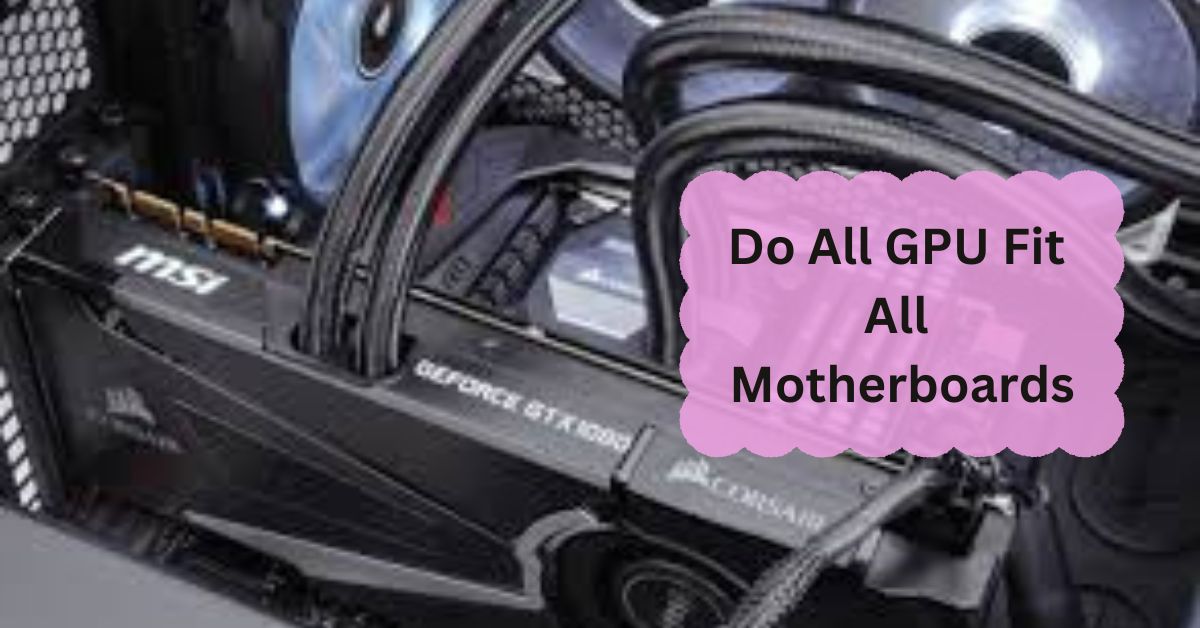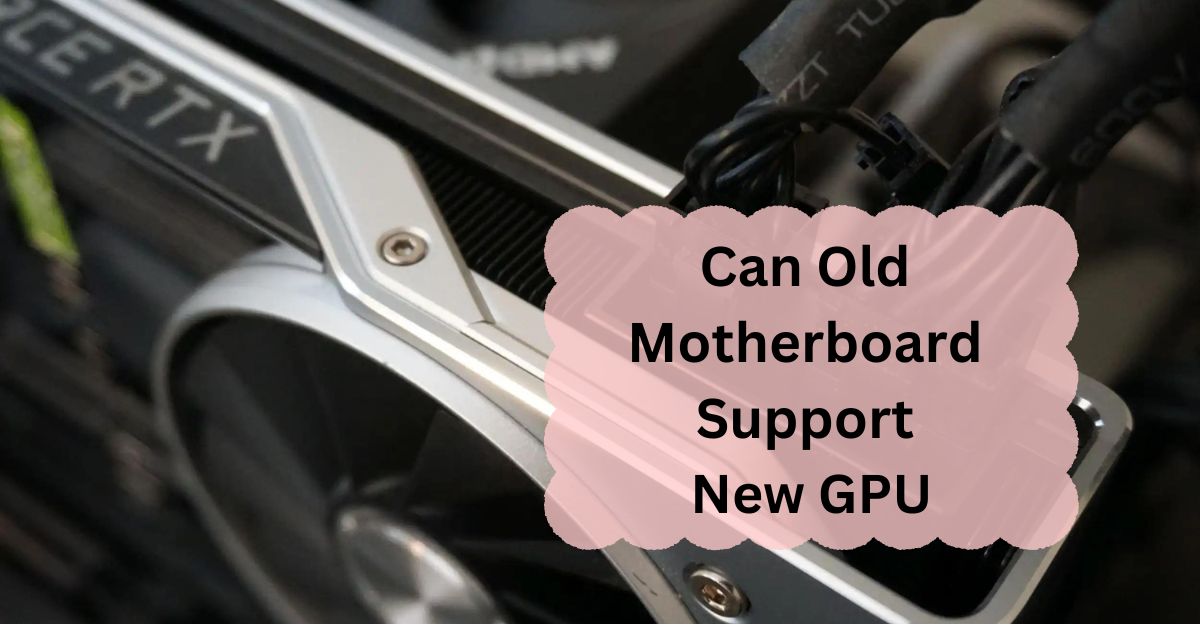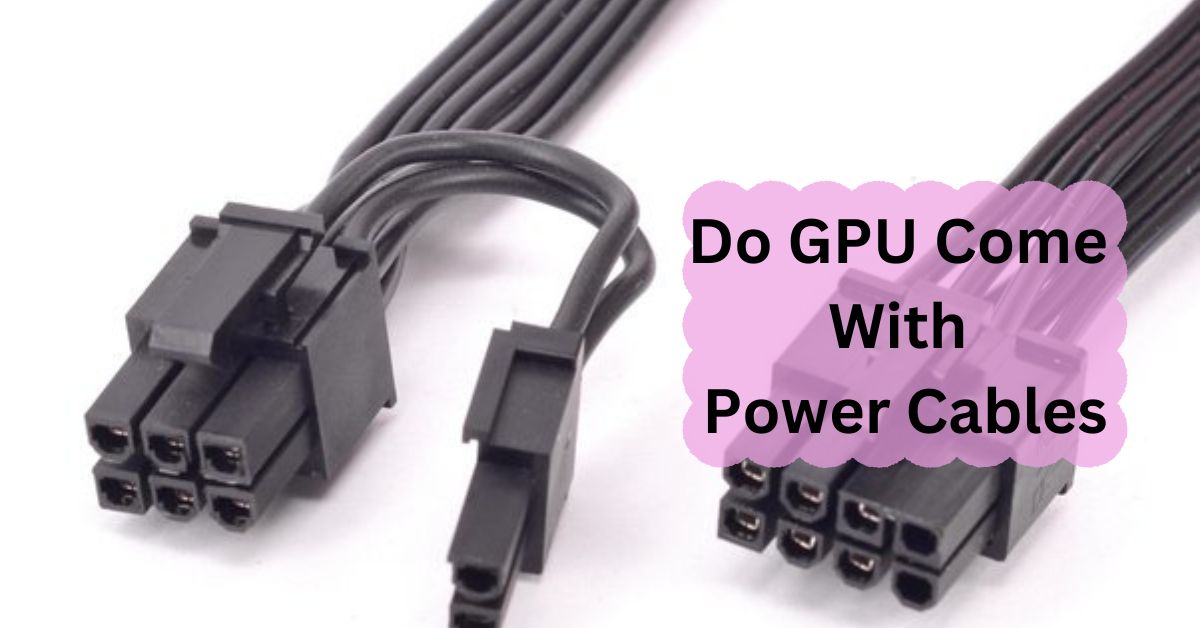One of the most common questions among PC builders is, “Do all GPUs fit all motherboards?” While the simple answer is no, the reality is a bit more nuanced. Many factors, such as motherboard form factor, power supply, and case size, come into play.
Not all GPUs fit all motherboards. It depends on the motherboard’s PCIe slot, GPU size, and case space. Most modern GPUs use PCIe slots but check compatibility with your motherboard’s size and power requirements before buying.
In this article, we will discuss “Do All GPU Fit All Motherboards”.
Table of Contents
What Is A GPU?
A GPU, or Graphics Processing Unit, is the hardware component responsible for rendering images and videos on your display.
GPUs are essential for gaming, video editing, and graphic design. They handle tasks that are too intensive for the CPU, ensuring smoother and faster performance in visual applications.
What Is A Motherboard?
A motherboard is the backbone of your computer. It connects all of the critical components, including the CPU, GPU, memory, and storage.
Think of it as a large hub that facilitates communication between your PC’s parts. A well-matched motherboard ensures optimal performance.
The PCIe Slot: The Common Ground
Most modern GPUs connect to the motherboard via a PCIe (Peripheral Component Interconnect Express) slot. PCIe is a high-speed interface used for graphics cards, SSDs, and other add-ons.
While most GPUs use PCIe slots, there are different versions (e.g., PCIe 3.0, PCIe 4.0, PCIe 5.0). Thankfully, PCIe slots are backward compatible, so a PCIe 4.0 GPU will work in a PCIe 3.0 slot, though with slight performance limitations.
Form Factors: Size Matters
While the PCIe slot is standard, not all GPUs are the same size. Some are larger and may not fit in all cases or motherboards. GPUs come in various sizes:
- Standard-sized GPUs are large and often require spacious cases.
- Mini GPUs are smaller and designed for compact builds.
- Low-profile GPUs are slimmer and fit in small cases.
Motherboard Form Factors and Their Impact on GPU Compatibility:
Motherboards come in different sizes or form factors, each affecting GPU compatibility:
- ATX: The most common and spacious, usually compatible with all GPUs.
- Micro-ATX: Slightly smaller but still fits most GPUs.
- Mini-ITX: Tiny form factor; may struggle with large, standard GPUs.
Smaller motherboards may limit GPU choices, especially if they have fewer PCIe slots or reduced space for components.
Power Supply: The Unsung Hero
A crucial part of GPU compatibility is power. Modern GPUs can consume a lot of electricity, and your power supply unit (PSU) needs to provide enough juice.
Most GPUs require additional power connectors (like 6-pin or 8-pin connectors), and if your PSU doesn’t have them, your GPU won’t work. Always check the wattage requirements of your GPU before installation.
Clearance Space: Fitting Your GPU in the Case
Even if your GPU fits the motherboard, it may not fit your case. Some GPUs are lengthy and require enough clearance space inside the PC case.
Always measure the available space in your case to ensure your new GPU will fit without blocking other components.
BIOS and Firmware: Behind the Scenes Compatibility
Sometimes, a motherboard may not recognize a new GPU due to outdated BIOS. Updating the BIOS can resolve these issues and improve system stability. It’s always a good idea to check for firmware updates before installing new hardware.
Will an Old GPU Work on a New Motherboard?
In most cases, older GPUs will work with new motherboards. Thanks to the backward compatibility of PCIe slots, even a PCIe 2.0 GPU will fit into a PCIe 4.0 slot. However, keep in mind that the performance will be limited by the older technology.
Will a New GPU Work on an Old Motherboard?
Newer GPUs will physically fit in older motherboards if they both use PCIe slots, but performance may be bottlenecked. For example, pairing a high-end GPU with a motherboard that only supports PCIe 2.0 can reduce the GPU’s potential.
Brand-Specific Considerations: Nvidia vs. AMD
Nvidia and AMD are the two leading brands in the GPU market. While both are designed to work with a variety of motherboards, some specific models may have optimized features for certain motherboards.
However, there are no major compatibility concerns between Nvidia or AMD and specific motherboards.
Special Use Cases: Multi-GPU Setups
If you’re considering using more than one GPU in your system, such as through Nvidia’s SLI or AMD’s CrossFire, you’ll need to ensure that your motherboard supports multi-GPU setups.
Additionally, the case will need enough space, and the PSU must be powerful enough to handle multiple GPUs.
How to Check Compatibility Before Buying:
Before purchasing, it’s a good idea to use online tools to check if your GPU will fit your motherboard and case. Tools like PCPartPicker allow you to build a virtual PC, ensuring that all parts, including the GPU, are compatible with your build.
How do I know if a GPU is compatible with my motherboard?
Check if the motherboard has a PCIe x16 slot, as most GPUs use this. Also, verify the power supply capacity and physical space in your case.
Do GPUs fit in all motherboards?
No, not all GPUs fit every motherboard. The motherboard needs a PCIe x16 slot, and you must check case size, power requirements, and motherboard compatibility.
How do I choose a graphics card for my motherboard?
Choose a GPU that fits your motherboard’s PCIe slot, has enough power supply support, and is physically compatible with your case. Also, check for compatibility with your CPU.
What GPU can my motherboard support?
Any GPU that fits in the PCIe x16 slot of your motherboard and is compatible with your power supply can be supported. Consider your case size and cooling.
Can I use any graphics card with any motherboard?
No, you must ensure the motherboard has a PCIe x16 slot and that your power supply and case can support the GPU’s size and power needs.
Can a GPU be incompatible with a motherboard?
Yes, a GPU can be incompatible if the motherboard lacks a PCIe x16 slot or if power and size requirements aren’t met.
Are all brands of a given graphics card equally compatible with all motherboards?
Yes, brands like ASUS, MSI, and Gigabyte generally follow standard designs. If the card uses PCIe x16, it should work across all motherboards with that slot.
Are GPU slots universal?
Most modern GPUs use PCIe x16 slots, which are standard on most motherboards, making GPU slots somewhat universal.
Do GPUs only work on certain motherboards?
GPUs work on most motherboards with a PCIe x16 slot, but power and physical space need to be considered for compatibility.
Would any graphics card fit onto a motherboard?
No, not every graphics card will fit. It depends on the PCIe slot availability, case size, and power supply.
Can GPU not be compatible with motherboard?
Yes, incompatibility happens if the motherboard lacks a PCIe x16 slot, or the case and power supply don’t meet GPU requirements.
How to check graphics card slot in motherboard?
Check your motherboard’s manual or look for a long PCIe x16 slot near the CPU socket. It’s where most GPUs connect.
Are all motherboards compatible with all CPU?
No, CPUs and motherboards must share the same socket type and chipset. Check compatibility before purchasing.
How to know if GPU will fit?
Measure your case’s available space and compare it to the GPU’s size. Also, ensure the motherboard has a PCIe x16 slot and enough power.
FAQs:
Do all GPUs use PCIe slots?
Yes, all modern GPUs use PCIe slots for connecting to the motherboard.
Can I fit a large GPU in a small motherboard?
It depends on your case size. Small motherboards may struggle to accommodate larger GPUs due to limited space.
Will a modern GPU work with an old motherboard?
Yes, but performance may be limited by the older PCIe version.
How do I know if my power supply is strong enough for a new GPU?
Check the GPU’s power requirements and ensure your PSU has the correct wattage and connectors.
Is it necessary to update the BIOS when installing a new GPU?
Sometimes, especially with older motherboards, a BIOS update may be required to recognize new GPUs.
Conclusion:
In conclusion, not all GPUs fit every motherboard. Compatibility depends on factors like the PCIe slot, GPU size, power supply, and case space. Always check your motherboard’s slot, case measurements, and power supply before buying a GPU. This ensures a proper fit and smooth performance for your PC build.


